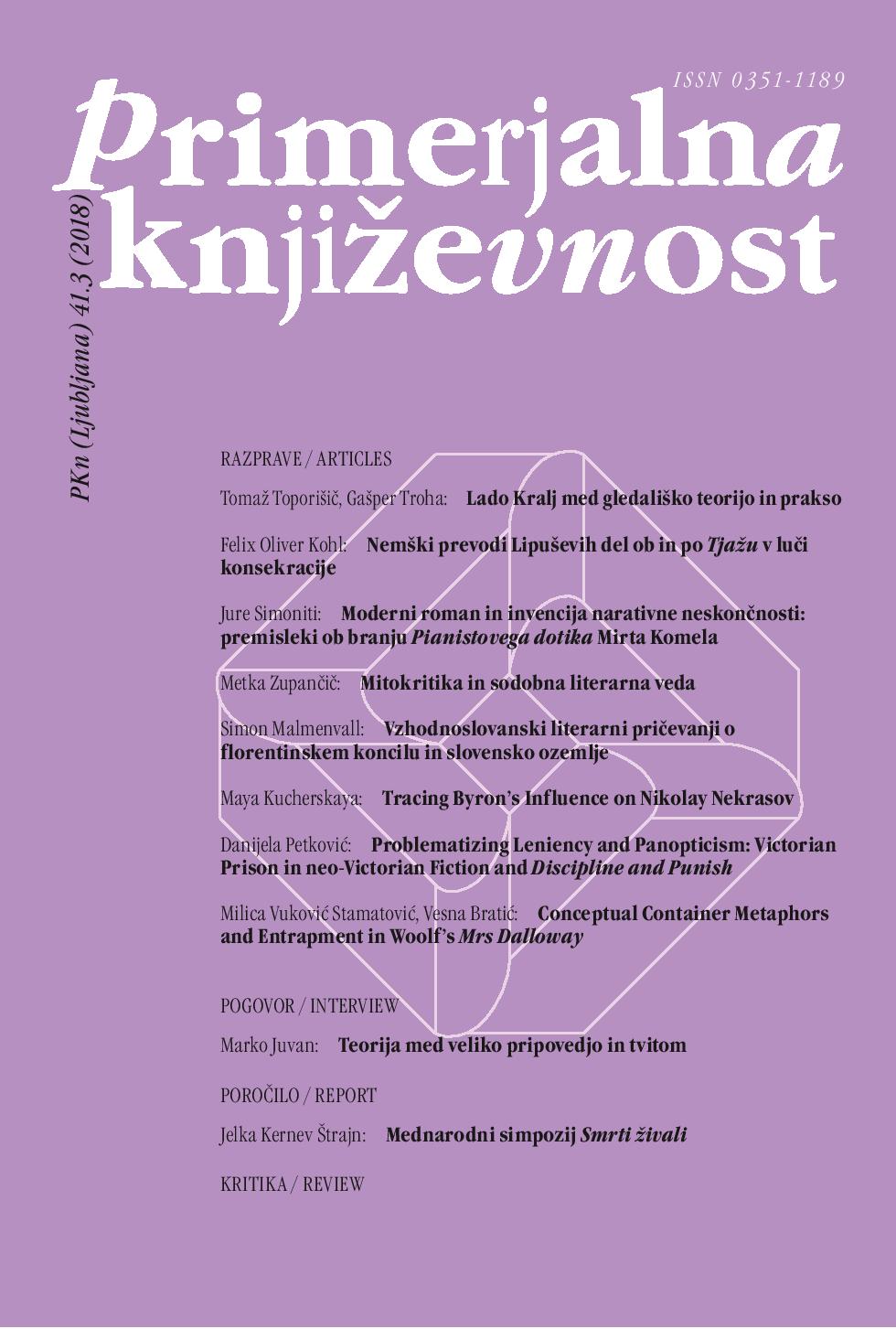Kritično k popustljivosti in panopticizmu: viktorijanski zapor v neoviktorijanski prozi ter v Nadzorovanju in kaznovanju
Ključne besede:
literatura in družba, angleška književnost, irska književnost, O’Connor, Joseph, Waters, Sarah, viktorijanska doba, Foucault, Michel, telo, kaznovanje, zaporPovzetek
Članek analizira romana Morska zvezda Josepha O’Connorja (2002) in Naklonjenost Sarah Waters (1999) v sklopu prikaza viktorijanskega zapora – nasproti Foucaultu – kot prostora telesnega kaznovanja in mučenja. Romana in članek viktorijanski zapor umeščajo v diskurze 19. stoletja, ki že predvidevajo napredovanje, izboljšanje oziroma spreminjanje zapornika, a obenem poudarjajo tudi kaznovalne in sadistične vidike teh naglo rastočih ustanov. S podrobno prostorsko organizacijo, arhitektoniko nadzorovanja in medosebno dinamiko moči med pazniki in priprtimi Morska zvezda in Naklonjenost vzpostavljata distanco do domnevne humanosti zaporne kazni kot netelesnega, reformiranega in reformirajočega tipa kaznovanja ter tako kot Nadzorovanje in kaznovanje zavračata hvalospev tedanji zakonodaji. A romana poleg tega problematizirata tudi Foucaultovo pojmovanje zapora kot modela disciplinarnih družb. V sklicevanju na sodobne raziskave viktorijanske penologije in zaporov ter na poročila o zaporniškem življenju iz 19. stoletja romana demonstrirata, da je obsojence in državljane bolj kot ponotranjena zavest o nadzorovanju discipliniralo monopolizirano nasilje zaporov oziroma grožnja z njim.Literatura
Agamben, Giorgio. Homo Sacer: Sovereign Power and Bare Life. Stanford: Stanford UP, 1998.
– – –. State of Exception. Chicago: University of Chicago Press, 2005.
Beccalossi, Chiara. Female Sexual Inversion: Same-Sex Desires in Italian and British Sexology, c. 1870–1920. Houndmills, Basingstoke: Palgrave Macmillan, 2012.
Brady, Sean. Masculinity and Male Homosexuality in Britain, 1861–1913. Houndmills, Basingstoke: Palgrave Macmillan, 2005.
Cherniavsky, Eva. Neocitizenship: Political Culture after Democracy. New York: NY Press, 2017.
Cocks, H. G. Nameless Offences: Homosexual Desire in the 19th Century. London and New York: I. B. Tauris, 2003.
Denfeld, Rene. The Enchanted. London: HarperCollins, 2014.
Duckworth, Jeannie. Fagin’s Children: Criminal Children in Victorian England. Hambledon: Continuum, 2002.
Edwards, Catherine. “The Millbank Penitentiary: Excavations at the Tate Gallery (Now Tate Britain), City of Westminster.” Lamas: London and Middlesex Archaeological Society. Web. 11 October 2018.
Farringdon, Karen. History of Punishment and Torture. London: Bounty Books, 2003.
Foucault, Michel. Discipline and Punish. New York: Vintage, 1995.
– – –. Language, Counter-Memory, Practice. Selected Essays and Interviews. Ed. Donald F. Bouchard. Ithaca: Cornell University Press, 2010.
– – –. “Right of Death and Power over Life.” The Foucault Reader. Ed. Paul Rabinow. New York: Pantheon Books, 1984. 258–273.
Han, Enze, and Joseph O’Mahoney. British Colonialism and the Criminalization of Homosexuality: Queens, Crime and Empire. London and New York: Routledge, 2018.
Ignatieff, Michael. A Just Measure of Pain. The Penitentiary in the Industrial Revolution, 1750–1850. London and Basingstoke: The Macmillan Press, 1978.
King, Jeannette. The Victorian Woman Question in Contemporary Feminist Fiction. Houndmills, Basingstoke: Palgrave Macmillan, 2005.
Kohlke, Marie-Luise. “Sexsation and the Neo-Victorian Novel: Orientalising the Nineteenth Century in Contemporary Fiction.” Negotiating Sexual Idioms: Image, Text, Performance. Eds. Marie-Luise Kohlke and Luisa Orza. Amsterdam and New York: Rodopi, 2008. 53–81.
Leigh, Samuel. “Leigh’s New Picture of London.” London Ancester: Genealogy & Family History. Web. 16 October 2018.
Lemon, Johanna, and Peter Daniel. “Millbank Prison.” Cholera and the Thames. Web. 16 October 2018.
Llewellyn, Mark. “‘Queer? I should say it is criminal!’ Sarah Waters’ Affinity (1999).” Journal of Gender Studies 13.3 (2004): 203–214.
Lordan, Robert. “Long Lost Dread: The Millbank Penitentiary.” View from the Mirror: A Cabbie’s London. Web. 15 October 2018. https://blackcablondon.net/2015/03/26/long-lost-dread-the-millbank-penitentiary/.
Mayhew, Henry. “The Criminal Prisons of London and Scenes of London Life (The Great World of London.” The Dictionary of Victorian London. Web. 5 October 2018.
Melossi, Dario, and Massimo Pavarini. The Prison and the Factory. Origins of the Penitentiary System. London and Basingstoke: The Macmillan Press, 1981.
Morton, Stephen, and Stephen Bygrave (eds.). Foucault in an Age of Terror: Essays on Biopolitics and the Defence of Society. Houndmills, Basingstoke: Palgrave Macmillan, 2008.
O’Connor, Joseph. Star of the Sea. London: Vintage, 2005.
Smith, Caleb. “Prison.” Keywords for American Cultural Studies, Second Edition. Eds. Bruce Burgett and Glenn Hendler. New York and London: New York University Press, 2014. 196–200.
– – –. “Solitude and Freedom: A Response to Saul Newman on Stirner and Foucault.” Postmodern Culture 14.3 (2004). Web. 17 October 2018.
Spierenburg, Pieter. The Prison Experience: Disciplinary Institutions and Their Inmates in Early Modern Europe. Amsterdam: Amsterdam UP, 2007.
Stack, John A. “Deterrence and Reformation in Early Victorian Social Policy: The Case of Parkhurst Prison, 1838–1864.” Historical Reflections 6.2 (1979): 387–404.
Storey, Neil. Prisons and Prisoners in Victorian Britain. Stroud, Gloucestershire: The History Press, 2010.
Taylor, Jack. “Archives of Death: Lynching Photography, Animalization, Biopolitics, and the Lynching of William James.” Economies of Death: Economic Logics of Killable Life and Grievable Death. Eds. Patricia J. Lopez and Kathryn A. Gillespie. London and New York: Routledge, 2015. 115–136.
Waters, Sarah. Affinity. New York: Riverhead Books, 2002.


